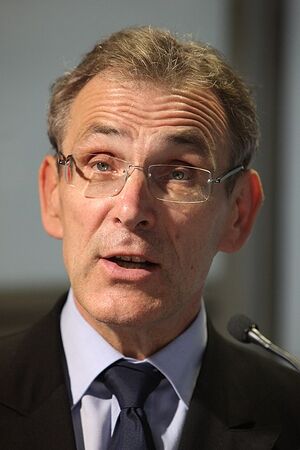Andris Piebalgs
( politician) | ||||||||||||
|---|---|---|---|---|---|---|---|---|---|---|---|---|
 | ||||||||||||
| Born | 1957-09-17 Valmiera, Latvian SSR, Soviet Union | |||||||||||
| Nationality | Latvian | |||||||||||
| Alma mater | University of Latvia | |||||||||||
| Member of | Friends of Europe | |||||||||||
| Party | Communist Party of the Soviet Union, Latvian Way, Latvia's First Party/Latvian Way, Independent, Unity (Latvia) | |||||||||||
Attended the 2006 Bilderberg as European Commissioner for Energy
| ||||||||||||
Andris Piebalgs is a Latvian educator, politician and diplomat who between 2004 and 2009 was Commissioner for Energy, then European Commissioner for Development at from 2010 until 2014. He attended the 2006 Bilderberg meeting, where one of the subjects was "Energy: What Are the Issues".
Contents
Background
Andris Piebalgs was born on 17 September 1957 in Valmiera, Latvia. Piebalgs is a graduate in Physics from the University of Latvia. He then worked as an teacher in his former school, was its deputy director and director. From 1988, Piebalgs held various positions in the Ministry for Education.[1]
Political activity In 1988, Latvian People's Front, an organisation that united more than 200,000 people, was established. Supporters of Latvian self-determination gained victory in the March 1990 parliamentary election. It was the first time since the Soviet takeover that candidates from various political parties were allowed to take part. On 7 May 1990, Andris Piebalgs was appointed as Minister of Education in the new Government, and one year later, in August 1991, Latvia regained full independence. Andris Piebalgs' main task was then to put in place the a new education system in Latvia. [1]
In September 1994, he became Latvia's Minister of Finance and deputy prime minister.[2]
From 1995 until 2003, he worked in the Latvian Diplomatic service. Andris Piebalgs first was ambassador of Latvia in Estonia (1995–1997), where he helped to solve the sea border issue between the two states. In 1997 he became the [Latvian Ambassador to the EU]]. In this capacity he helped to establish Latvia as the EU candidate country and led the accession negotiations, which resulted in Latvia's successful accession to the EU in 2004[1].
From 2003 to 2004, he was appointed Deputy Secretary of State for EU affairs at the Ministry of Foreign Affairs of Latvia. His role was instrumental in coordinating Latvia's position in the European Council and all Council formations.[1]
EU commissioner
Between 2004 and 2009 he appointed Commissioner for Energy, for then to be appointed European Commissioner for Development at the European Commission from 2010 until 2014.[1]
Commissioner for Energy
During the first Barroso Commission, starting in November 2004, he was the European Commissioner for Energy. On 15 November 2004 when questioned by the European Parliament as the Commissioner Designate for Energy, Piebalgs stressed the importance of environmental considerations in energy policy, and announced his intention to pursue a policy framework based on limiting growth in demand for energy while increasing diversity. He received strong backing from many parties, including the Greens.
European Commissioner for Development
The hearing of the Commissioner Designate for Development took place on 11 January 2010 in the European Parliament. During three hours members of the European Parliament (MEPs) from Committees of Development, Foreign Affairs and International Trade questioned him about his political priorities and key aims of development policy. Piebalgs stressed that one of his main priorities in the office would be to achieve the Millennium Development Goals (MDG).
Other activities
From 2012 to 2013, Piebalgs sat – alongside Ellen Johnson Sirleaf, David Cameron and others – on the High-level Panel on Post-2015 Development Agenda, an advisory board established by United Nations Secretary-General Ban Ki-moon to develop the global development agenda beyond 2015, the target date for the Millennium Development Goals.[3]
In addition, Piegbals has held various honorary positions, including:
- Friends of Europe, member of the board of trustees
- Friends of the Global Fund, member of the board
Events Participated in
| Event | Start | End | Location(s) | Description |
|---|---|---|---|---|
| Bilderberg/2006 | 8 June 2006 | 11 June 2006 | Canada Ottawa | 54th Bilderberg, held in Canada. 133 guests |
| Brussels Forum/2010 | 26 March 2010 | 28 March 2010 | Belgium Brussels | Yearly discreet get-together of huge amount of transatlantic politicians, media and military and corporations, under the auspices of the CIA and NATO-close German Marshall Fund. |
| Brussels Forum/2011 | 25 March 2011 | 27 March 2011 | Belgium Brussels | Yearly discreet get-together of huge amount of transatlantic politicians, media and military and corporations, under the auspices of the CIA and NATO-close German Marshall Fund. |
| WEF/Annual Meeting/2007 | 24 January 2007 | 28 January 2007 | Switzerland WEF | Only the 450 public figures listed of ~2200 participants |
| WEF/Annual Meeting/2009 | 23 January 2009 | 27 January 2009 | Switzerland WEF | Chairman Klaus Schwab outlined five objectives driving the Forum’s efforts to shape the global agenda, including letting the banks that caused the 2008 economic crisis keep writing the rules, the climate change agenda, over-national government structures, taking control over businesses with the stakeholder agenda, and a "new charter for the global economic order". |
References
- ↑ Jump up to: a b c d e https://archive.wikiwix.com/cache/index2.php?url=http%3A%2F%2Fec.europa.eu%2Fcommission_2010-2014%2Fpiebalgs%2Fabout%2Fbio%2Findex_fr.htm#federation=archive.wikiwix.com&tab=url
- ↑ https://web.archive.org/web/20200727232448/https://www.fm.gov.lv/en/ministry_of_Finance/history/43378-history
- ↑ Secretary-General Assembles High-level Panel on Post-2015 Development Agenda, Appointing 26 Members of Government, Civil Society, Private Sector United Nations Secretary-General, press release of 31 July 2012.